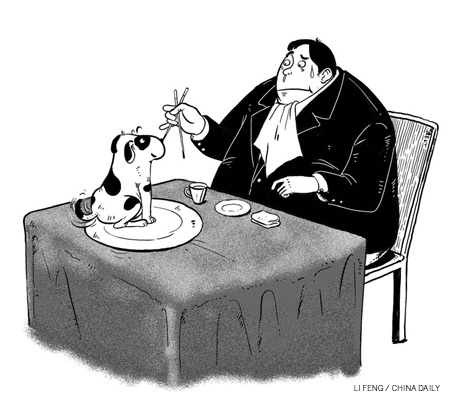Op-Ed Contributors
Debate: Dog meat
Updated: 2011-04-25 07:59
(China Daily)

Should the slaughtering and eating of dogs be banned? A teacher and dog lover says an emphatic "yes", but a journalist differs.
Dogs not meant to be eaten, but loved
Poison for one can be meat for others
Eric Sommer
Dogs not meant to be eaten, but loved
Mahatma Gandhi, the apostle of peace who led the movement to free India from British rule, once said: "The greatness of a nation and its moral progress can be judged by the way its animals are treated."
There is no doubt that contemporary China is a country with high moral values. It has never attacked another country, has no military base outside its borders, has one of the lowest rates of violent crimes and is deeply concerned with the social and economic welfare of its people.
But when it comes to animal rights, China may well fail the Gandhi test. Recently, animal rights activists stopped a truck carrying about 500 dogs on the Beijing-Harbin Highway and prevented them from being butchered and sold as dog-meat in Changchun, Jilin province. The incident has ignited a nationwide debate on the treatment of dogs, and the majority seems to support the sale and consumption of dog meat.
Though illegal in many other countries, there are no laws against the slaughter and consumption of dogs in China. In fact, the serving of dog meat in Chinese restaurants has increased in recent years.
People who eat dog meat have put forward several arguments in their favor. They say dogs have been eaten in China for thousands of years. They argue that there are no extra health hazards from eating dog meat, and instead claim that it has "health benefits" because it contains "certain medicinal properties". In general, they contend that eating dogs is no different from eating any other animal, and accuse people opposing it of practicing a kind of cultural imperialism based on the practices in their countries.
There is, however, a strong argument against eating dogs: they are more intelligent and higher up in the development chain than the other animals we commonly consume as food. Research studies show that a typical dog can count up to four or five, understand more than 150 words, solve spatial problems by modeling on the behavior of humans or other dogs, and generally its mental ability is similar to a two or two-and-half-year-old child.
"(Dogs) may not be Einsteins but are sure closer to humans than we thought," says Stanley Coren, professor of psychology and dog expert at the University of British Columbia, Canada.
A second reason for banning dog meat is the changing sensibilities of Chinese people, who are increasingly adopting dogs as pets. Once introduced as a pet, a family typically comes to consider a dog as another family member - a "baby of the family" or a companion that must be cared for and respected like any of the others.
Even learning about, let alone seeing, others eating dogs can be repulsive and upsetting for such people. For them, eating dog meat is similar to cannibalism. This newfound sympathy for pets has been reflected in a movement against consumption of dog and cat meat in the country in recent years.
To begin with, the Chinese animal protection network has more than 40 member societies and has organized well-publicized protests in Guangzhou, Guangdong province, and many other cities since 2006.
Besides, online signature campaigns against eating dog and cat meat have been joined or started by more than 10 groups, attracting tens of thousands of signatories. More importantly, an online poll that attracted about 100,000 respondents shows that more than 52 percent support a ban on eating dog meat, with only 33 percent opposing such a move.
Finally, the appeal to ban dog meat has reached the highest levels in the country. A draft to ban dog meat was introduced in the National People's Congress last year, though no legislation has been passed. The draft proposes banning the consumption of dog and cat meat, and fining those violating the proposed rule up to 5,000 yuan ($768) and sentencing them to 15 days in jail. Organizations found selling dog or cat meat, the draft says, should be fined between 10,000 and 500,000 yuan.
With an increasing number of Chinese adopting dogs as pets and treating them like family members and the rising opposition to selling and eating of dog meat, it's time China banned the consumption of dogs and cats as food.
The author, a Canadian, is a Beijing-based teacher.
Specials

Models gear up car sales
Beauty helps steer buyers as market accelerates.

Urban breathing space
City park at heart of industrial hub positions itself as top tourism attraction

On a roll
Auto hub Changchun also sets its sight on taking lead in railway sector